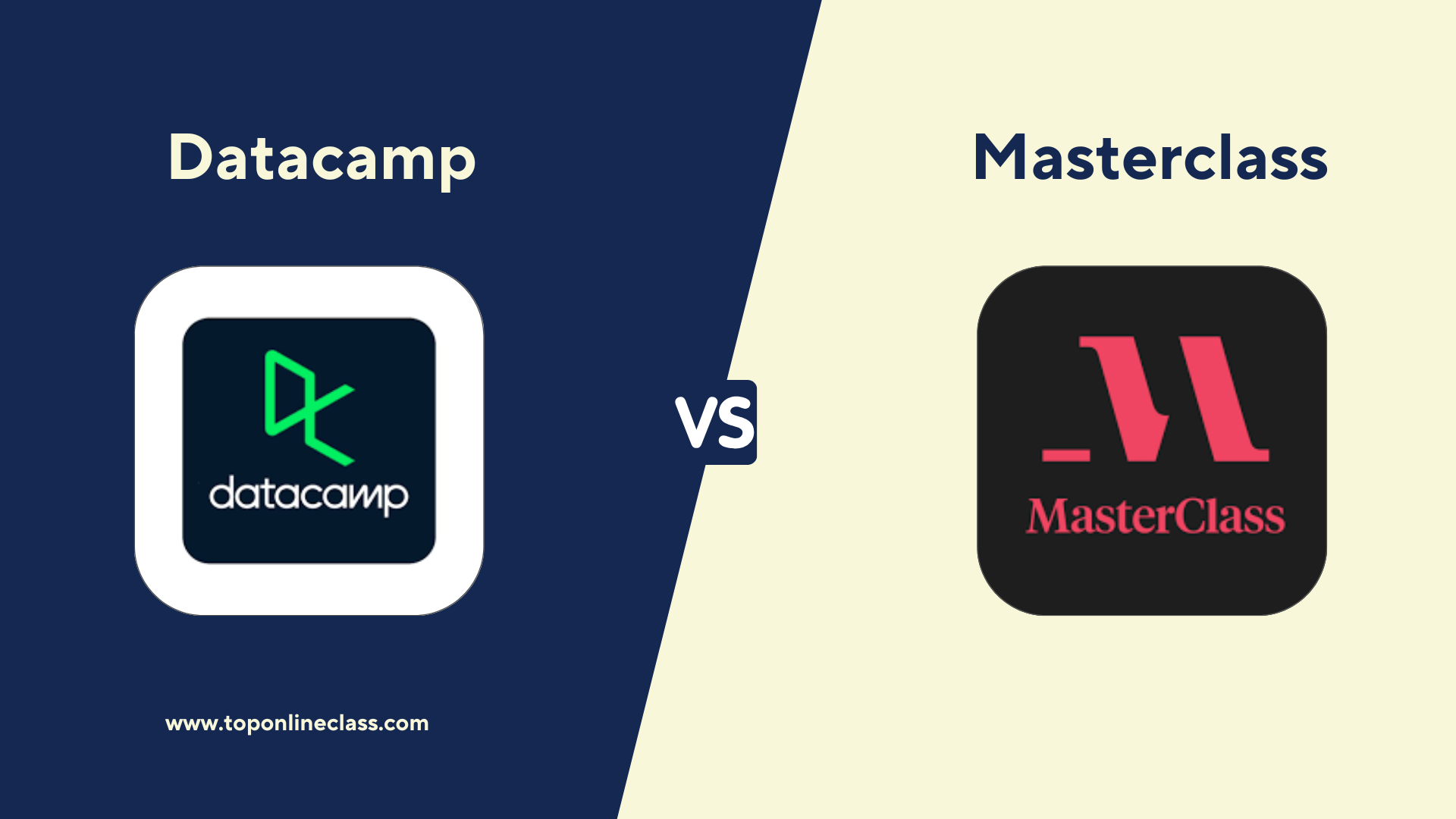In today’s world of online learning, there are an overwhelming number of platforms to choose from, each offering unique approaches to education.
Two of the most popular options are MasterClass and DataCamp, both offering distinct learning experiences that cater to different types of learners. But which platform truly delivers the most value for your goals?
MasterClass is an entertainment-focused platform that allows you to learn from world-renowned experts in fields like cooking, writing, acting, music, and more. The appeal of MasterClass lies in its ability to offer access to the best minds across a wide array of creative disciplines.
Whether you want to learn how to cook from Gordon Ramsay or improve your writing with Margaret Atwood, MasterClass provides an immersive, high-quality experience that sparks inspiration and broadens your horizons.
In contrast, DataCamp takes a more specialized approach, focusing on teaching technical skills such as data science, programming, and analytics. If your goal is to gain hands-on experience in Python, R, SQL, or machine learning, DataCamp is a perfect choice.
It’s designed for those who want to dive deep into the world of data and analytics, providing interactive exercises and certifications that help build job-ready skills.
But with different goals, structures, and teaching methods, it can be tough to decide which platform is right for you. In this article, we’ll compare MasterClass and DataCamp across various factors, helping you determine which platform provides the most value based on your learning objectives.
1. Introduction: A Glimpse Into MasterClass and DataCamp
What is MasterClass?

The platform known as MasterClass offers an online subscription model where you get access to hundreds of video‑led classes taught by high‑profile instructors and experts across a variety of fields. The site describes itself as “the streaming platform that makes it possible for anyone to watch or listen to hundreds of video lessons taught by 200+ of the world’s best.”
MasterClass spans topics such as cooking, business, art & design, writing, sports, music, wellness and more. The format tends toward high production value, smooth video lectures, and inspirational storytelling rather than intensive technical work.
One review notes that while MasterClass is “great for inspiration and insight from industry leaders,” it might be less suited if you are aiming purely at skill‑acquisition to boost career credentials.
What is DataCamp?
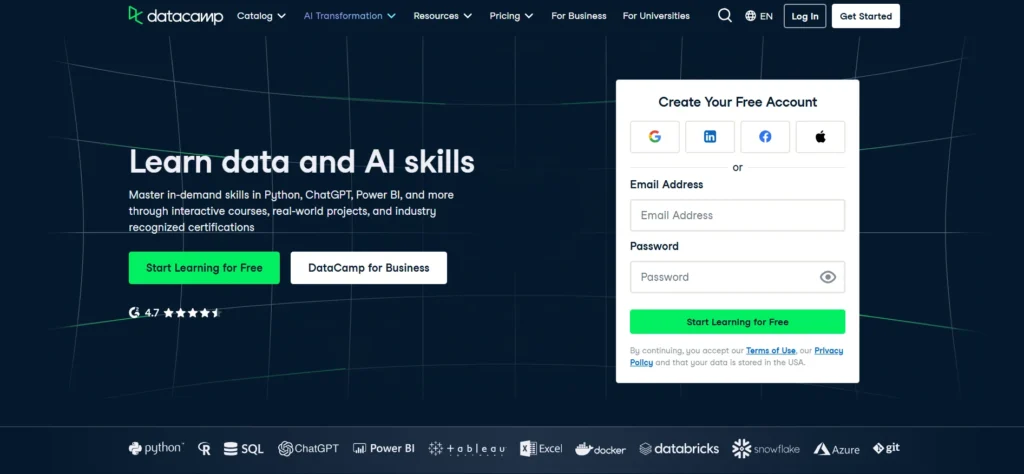
DataCamp is, by contrast, a platform built specifically for data science, analytics, programming (especially Python, R, SQL) and the skills that drive modern data‑driven work. Their mission statement highlights that they teach “the skills companies and individuals need to work with data in the real world.”
Their approach emphasises interactive coding exercises, career‑oriented tracks, skill‑assessment and projects. For example: “Learn Data Science & AI from the comfort of your browser, at your own pace with DataCamp’s video tutorials & coding challenges on R, Python, …”
In short: MasterClass is broad, creative and inspiration‑driven; DataCamp is narrow, technical and execution‑driven. The question then: which one offers more value for you, given your learning goals? Let’s dig in.
2. Course Offerings: Diversity vs Specialization
MasterClass Courses: A Broad Range

With MasterClass, one of the strongest pull‑factors is the sheer diversity of subjects. You are not just learning one discipline — you could learn cooking from a top chef, writing from a celebrated author, photography or design from an industry icon. The platform lists categories like Acting & Performing Arts, Art & Design, Business & Entrepreneurship, Food & Drink, Health & Wellness, Science & Technology, among others.
Because of this breadth, MasterClass is well‑suited for someone who is curious, wants to dabble or diversify, explore a passion, or learn via luminaries. The production value is attractive; the videos are often short, well filmed and story‑driven. For instance, a review says each course has “about 20 bite‑sized lessons, around 10 minutes each.”
However, this breadth comes with trade‑offs. Some parts of reviews suggest that many courses are more conceptual or inspirational than highly technical or deeply skilling. For example, one review says: “If you want to learn skills you can use immediately or advance your career then platforms like Skillshare or Coursera are more practical.”
DataCamp Courses: Deep Dive Into Data Science
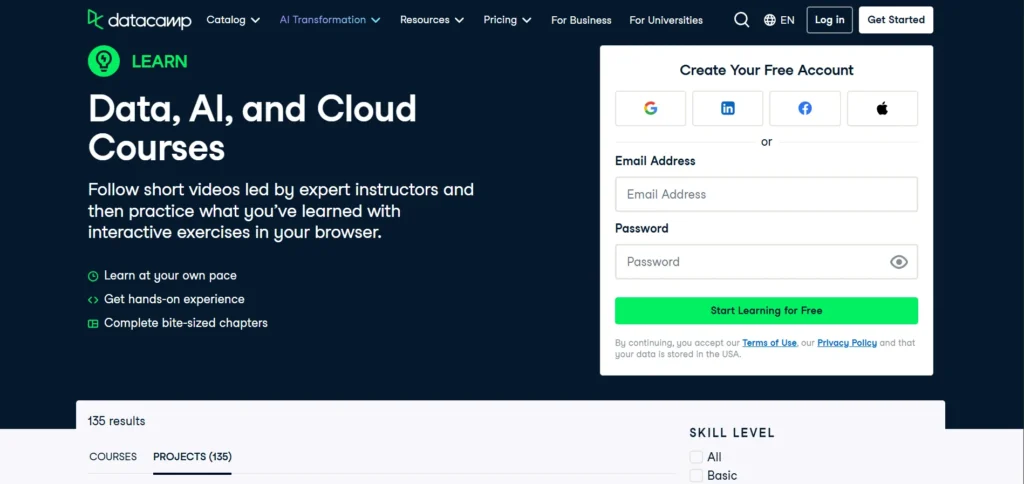
DataCamp, in contrast, is very much focused. The catalogue is about data science, analytics, programming — which includes courses in Python, R, SQL, statistics, machine learning, data visualization, and career‑tracks built around becoming a data analyst, data scientist, etc. For instance: one of its courses, “Introduction to Data”, covers data types, structures, data ethics and the lifecycle of data.
Their site features a listing of “Data, AI and Cloud Courses” with short videos led by expert instructors and then interactive exercises.
Because of this specialization, if your learning goal is something like “become proficient in data science or analytics”, DataCamp offers a focused pathway: start from fundamentals, build up through programming and then into domain‑specific tools (e.g., Power BI, Tableau) and real‑world application. For example, they have a “Data Analyst in Tableau” and “Data Scientist in Python” tracks.
But evidently with that specialization comes less breadth. If you are looking to explore, say, photography, cooking, film, or writing — you won’t find those topics in DataCamp (or at least not with the same hero‑expert instructors).
Bottom line on this section
- If your learning goal is “explore new passions, pick up creative or lifestyle skills, learn from renowned figures”, then MasterClass leads.
- If your goal is “acquire technical, data‑driven skills, become job‑ready in analytics or data science”, then DataCamp has the edge.
- Value depends heavily on what you want to learn — breadth vs depth, exploration vs career readiness.
3. Learning Style: Interactive vs Passive
MasterClass Learning Experience: Passive Yet Inspirational
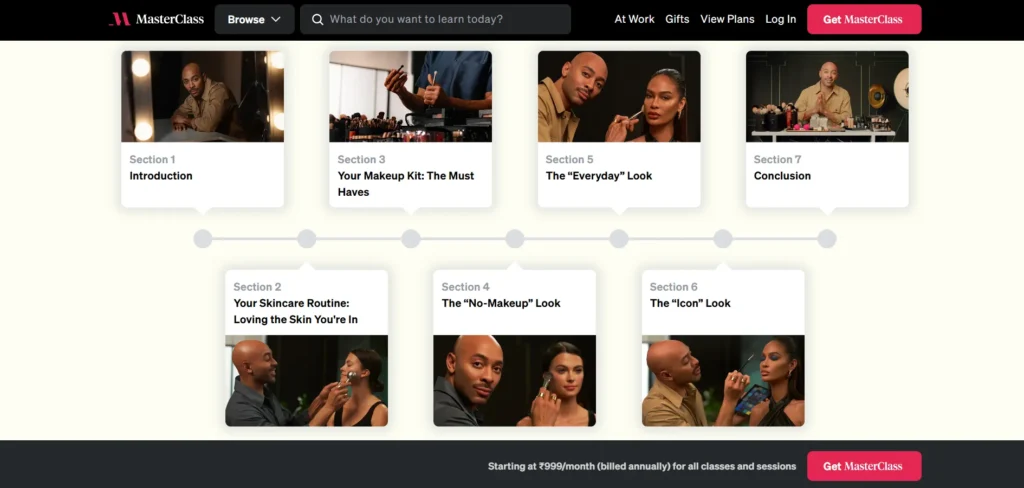
MasterClass offers a more passive learning experience compared to DataCamp. The core of MasterClass’s teaching approach revolves around watching video lessons delivered by top-tier experts. Each course is designed to inspire and provide valuable insights into a particular field, but the interaction is minimal. While you can download workbooks and engage in reflective exercises, the platform doesn’t offer hands-on activities that allow you to practice what you’ve learned in real-time.
For people who enjoy learning by observation, MasterClass is a great choice. It provides you with the chance to absorb the knowledge and wisdom of industry leaders without requiring you to participate in practical exercises. However, if your learning style depends on active participation or hands-on practice, you might find MasterClass to be somewhat limited.
DataCamp Learning Experience: Active and Hands-On
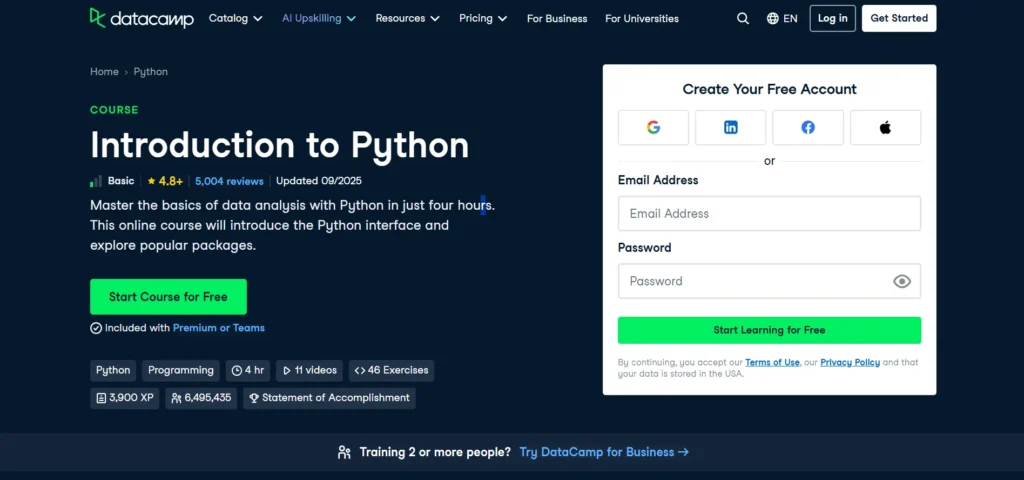
DataCamp, in contrast, is built around an interactive learning experience. As a data science-focused platform, it offers coding exercises, quizzes, and real-world projects to ensure that learners can apply what they’ve learned. After watching a tutorial or reading through the material, you’ll be asked to write code or solve problems directly in your browser. This hands-on approach is critical for developing technical skills like programming, where practice is just as important as theory.
The interactive nature of DataCamp makes it a more engaging experience for anyone looking to actively learn and develop their skills. You get immediate feedback on your work, allowing you to troubleshoot and refine your understanding in real-time. If you’re someone who learns best by doing, DataCamp will likely be more effective for you.
Summary of learning style
- MasterClass = inspirational, passive‑watch oriented, good for high level ideas, for inspiration, for broad learning.
- DataCamp = active, hands‑on practise oriented, good for developing real skills, especially technical.
- If you learn best by doing, DataCamp may be more effective. If you prefer watching, reflecting, exploring more widely, then MasterClass may suit you better.
4. Pricing: Value for Money
MasterClass Pricing
MasterClass follows an annual subscription pricing model. You pay upfront for an entire year, giving you unlimited access to the platform’s library of courses. The basic subscription typically costs around $180 per year, though discounts and promotions may occasionally be available. For those who want to access more features, such as the ability to share your subscription with family members, there are premium plans that cost more.
For the price, you gain access to more than 200 courses, making the per-course cost relatively low if you plan on engaging with a large number of lessons. However, if you only plan to take a few courses, the subscription may feel like a significant investment. Still, MasterClass’s model makes it a good value if you’re someone who wants to explore multiple fields and learn from experts in a variety of disciplines.
DataCamp Pricing
DataCamp offers a similar subscription model with a free option that provides limited access to the platform’s resources. However, to unlock the full suite of courses, you need to purchase a subscription. DataCamp’s pricing is slightly more flexible than MasterClass, with various tiers that cater to individuals, students, and businesses.
For individuals, the basic subscription is priced at approximately $25 per month or $240 per year, while the premium plan may cost slightly more depending on the features included. DataCamp also offers discounts for students, which can make it an attractive option for learners on a budget.
Given that the platform focuses on technical training, it offers substantial value for anyone looking to build skills in programming, data science, and analytics.
5. Certifications: A Matter of Value
MasterClass Certifications
MasterClass does not offer formal certifications upon completion of its courses. The platform’s primary focus is on learning from industry leaders and gaining inspiration, rather than providing credentials that would be recognized by employers. While you can download certificates of completion, they do not carry the same weight as certifications from more career-focused platforms like DataCamp.
If your goal is to acquire industry-recognized credentials for professional purposes, MasterClass may not be the best choice. However, if you’re learning for personal enrichment or to deepen your creative skills, the absence of formal certification might not be a deal-breaker.
DataCamp Certifications
DataCamp, in contrast, offers industry-recognized certifications that can be valuable when applying for jobs. After completing certain courses or tracks, learners can earn certificates that demonstrate their proficiency in data science, machine learning, and other technical fields. These certifications can serve as proof of your skills and may enhance your resume, making you more attractive to potential employers.
For individuals looking to gain technical certifications in data science, analytics, or programming, DataCamp provides more tangible value. The platform’s certifications are well-regarded in the industry, and completing them can help you stand out in a competitive job market.
6. User Experience: Interface and Navigation
MasterClass Interface
MasterClass offers a clean, user-friendly interface that is easy to navigate. The design focuses on simplicity and visual appeal, with beautifully crafted video lessons that are easy to access. You can browse courses by category, instructor, or subject, and you’ll find plenty of extra materials like workbooks and assignments. However, the platform lacks the same level of interactivity found in more technical learning platforms, as it is geared towards passive consumption of content.
DataCamp Interface
DataCamp’s interface is designed for interactive learning, with a focus on coding exercises and quizzes. The platform has an intuitive dashboard that helps you track your progress, view your course completion, and monitor your achievements. Unlike MasterClass, DataCamp requires more active engagement, as you’ll need to write code and solve problems directly in your browser.
While DataCamp’s interface is slightly more complex due to its interactive nature, it’s still user-friendly and easy to navigate. The platform’s focus on hands-on learning makes it more dynamic than MasterClass, but this also means that it may take a little longer to get used to.
7. Community and Support: Learner Interaction
MasterClass Community
MasterClass offers limited community features. The platform does not have a dedicated forum or live interaction with instructors, as it is primarily designed for individual, self-paced learning. While you can engage with fellow learners through social media, MasterClass does not provide the same level of community interaction that other platforms might offer.
DataCamp Community
DataCamp places a strong emphasis on learner support and community interaction. The platform offers discussion forums where you can interact with other learners, ask questions, and share ideas. Additionally, DataCamp provides live support for troubleshooting issues and resolving technical difficulties. For anyone looking for a more connected learning experience, DataCamp’s focus on community support provides added value.
Final Verdict: Which Platform Should You Choose?
After diving through course offerings, learning style, pricing, certifications, interface, and support, here’s how I’d distil the verdict for you:
- Choose MasterClass if your goal is exploration, inspiration, personal enrichment, creative or lifestyle learning. You want to learn from world‑class people (chefs, writers, athletes, artists) and enjoy a polished video experience. You don’t necessarily need formal certification or deep technical practise. The value comes from breadth and inspiration.
- Choose DataCamp if your goal is skill‑building, career development, becoming job‑ready in an analytics/data role, or acquiring technical competencies. You’re comfortable practising, writing code, doing projects, and you care about certification. The value is in depth and relevance.
If I were to summarise in one line: MasterClass gives you many doors to explore; DataCamp gives you one door and helps you walk through it into a new skill‑set.
Also consider your budget and time: If you’ll engage actively, DataCamp can deliver big value; but if you’re uncertain you’ll stick through the heavy parts, then MasterClass’s lower friction may give you more immediate satisfaction.
Given you’re a content writer (which I recall), you might find interesting crossover: For creative writing, storytelling, research etc, MasterClass may offer unique inspiration. But if you ever decide to upgrade into data analytics for content strategy, DataCamp might be a long‑term investment.
Ultimately the “value” depends on how you engage with whichever platform. The best platform is the one you’ll use consistently, because engagement drives value.
FAQs
Can I get a refund if I don’t like either platform?
- For MasterClass: yes, there is a 30‑day satisfaction guarantee on annual memberships.
- For DataCamp: check the subscriber terms; there is free access to first chapters, but refund policies vary by region.
Which platform gives more credential value for jobs?
- DataCamp has formal certifications aligned with industry roles, so better credential‑value for data/analytics jobs.
- MasterClass is less about certification and more about enrichment, so less job‑credential oriented.
If I only have a few hours per week, which platform is better?
- If you prefer light engagement and broad learning: MasterClass.
- If you’ll dedicate focused hours regularly and practise: DataCamp.
Can I use MasterClass for technical skills like programming?
Generally no — MasterClass is less suited for intensive technical skills; it doesn’t focus on coding practice.
If I stop using the platform, will I lose value?
Yes: both platforms require you to engage to extract value. With an annual subscription you pay up‑front; if you don’t use it, the cost stays. The benefit is directly tied to usage.

